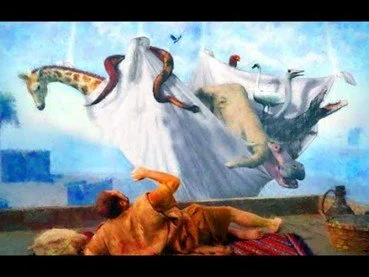Reading Luke/Acts Together #65 – Tablecloth Descending
Acts chapters 10 and 11 form one complex story, with scenes that fit together to complete an astonishing shift in the life of the church and in the lives of Christians. We begin with Cornelius, a Roman commander of considerable authority and probably wealth. He is a “God-fearer” – a term used back then for Gentiles who were interested in Judaism, listening in on Sabbath services but on the fringes, like students auditing a course, not fully in. Quite a few God-fearers (Lydia will be another in Acts 16) evidently found what they’d been waiting for in Christianity, and converted – which aroused understandable jealousy among the Jews, for they lost not just these auditors but also their money!
At about 3pm, Cornelius was surprised by a vision of an angel telling him to dispatch men to Joppa to find someone named Peter, who was visiting in the home of a tanner named Simon. And so he did. The next day (the journey to Caesarea would have taken the men about a day and a half), Peter went up on Simon’s roof around noon to pray. Verse 10 tells us he got hungry while praying! So God sent him, not food, but a vision of a huge tablecloth filled with creatures descending from heaven – many of them regarded as unclean.
When God tells Peter to kill and eat, Peter resists, explaining what God already knows – that Peter has never and would never touch much less eat such creatures. I love that. God commands, and Peter is so steeped in his own purity he dares to tell God that what God just commanded is wrong. Dietrich Bonhoeffer touched on the same issue when he said Doing God’s will isn’t keeping your hands clean; it’s getting your hands dirty for God.
But God is doing a new thing. God, being God, is always free to do new things, even to leap beyond what’s plain in some location in Scripture itself. Willie Jennings puts it beautifully: “Peter must explain the inexplicable. He must suture together a known faithfulness with an unknown faithfulness. Nothing has changed, but everything has changed. Peter must lay his body across the line between clean and unclean and give witness to its transformation into a bridge.”
So Peter goes, caving in to the wave of the miraculous. He eats, not just food he’d been taught as unclean, but also with the Gentile! And all this on the heels of Paul’s conversion in Acts 9! Makes your head spin. Imagine the earliest Christians, and God-fearers, and Jews, and even the pagans trying to make sense out of such radical and rapid change! Acts 11 is Peter’s explanation to the key Christian leaders back in Jerusalem of what he did, why he did it, and why from now on Gentiles were to be included, and Gentiles and Jews would from now on be eating together.
He convinced some, but not all. How could his words be anything but too weak? All he had was his own private experience to share. Willie Jennings compares what Peter experiences and then shares with playing jazz. The band is playing. Then there’s a break. The band stops, the soloist must then improvise. Some pressure – and yet delight – right? “Peter brings them to the break, but the Spirit of God carries the time, holding it in silence. God has been keeping time beautifully and faithfully with Israel and now expects hearers to feel the beat, remember the rhythm, and know the time.”
Why did Christianity include Gentiles? Not so their numbers would swell, and not to increase revenues. It was entirely from the heart of God. As God is all mercy and all grace, and the creator of all people, the absurd question isn’t “Why include him or her?” but rather, “Why exclude anybody?”
